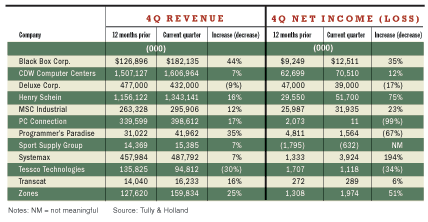The majority of the publicly traded business-to-business merchants tracked by Multichannel Merchant ended 2005 with solid fourth-quarter gains. Year-over-year sales rose for 83% of the companies. Only Deluxe Corp. — which gains the vast majority of its sales from its checks business rather than from its New England Business Service (NEBS) collection of catalogs — and wireless communications provider Tessco Technologies suffered a decline in revenue. What’s more, two-thirds of the companies sported improved bottom lines.
“Furthermore, for the most part P/Es continue to be at or above market rates in our b-to-b index,” says Stuart Rose, managing director of Wellesley, MA-based investment bank Tully & Holland, which tracks the companies for Multichannel Merchant. “This points to continued optimism for this sector.
Net income down for PC Connection
Quarter ended: Dec. 31 The facts: Although revenue for Merrimack, NH-based PC Connection rose 17%, to $398.6 million, net income fell 99%, to just $11,000. Both resulted largely from the computer reseller’s October 2005 acquisition of Amherst Technologies. Revenue figures included $25.2 million from Amherst Technologies, a Manchester, NH-based IT solutions provider, Amherst contributed $25.2 million in sales for the quarter. But special charges and effects of the acquisition ate away at the bottom line. In a statement, CEO Patricia Gallup described the period as “an investment quarter” for the company. “In addition to the transitional costs related to the purchase of Amherst Technologies assets, our fourth-quarter results were affected by the company’s increased investments in customer acquisition programs and other marketing initiatives. We also experienced lower-than-anticipated gross margins due primarily to product mix and our targeting of high-value customers.” The skinny: During the quarter PC Connection distributed nearly 6.3 million catalogs and entered 380,000 orders. For the same quarter of 2004, it had mailed 42% more catalogs but entered 14.5% fewer orders.
Transition of T-Mobile hurts Tessco
Quarter ended: Dec. 25 The facts: At Hunt Valley, MD-based Tessco Technologies, which provides wireless communications products and services, fourth-quarter slid 30%, to $94.8 million, and net income dropped 34%, to $1.1 million. Sales to consumers plunged 97%, primarily due to the end of an affinity relationship it had with T-Mobile USA. In September 2005, T-Mobile USA transitioned away from the Tessco-provided e-commerce marketing and sales system to an inhouse Web solution and alternative third-party logistics provider, at which point Tessco ceased to reap revenue from the relationship. For the six months ended Sept. 25, T-Mobile had accounted for 45% of the company’s revenue and 22% of its gross profit. What’s more, Tessco incurred approximately $160,000 in one-time expenses associated with the end of the relationship. The skinny: On the bright side, core revenue from Tessco’s commercial and government markets grew 35%.
Double-digit growth at Black Box
Quarter ended: Dec. 31 The facts: Networking products and services provider Black Box logged increases of 44% and 35% in revenue and income respectively for the quarter. For its fiscal third quarter the Lawrence, PA-based firm netted $12.5 million, or 7% of revenue, on $182.1 million in sales. The company attributed the strong performance in part to “effective marketing” of its data networking, voice networking, and hotline technical services and to “relatively stable end markets.” The skinny: Free cash flow for the quarter hit $24 million, up markedly from $14 million a year earlier. Black Box used the cash flow to fund $14 million of merger-related activity, reduce debt by $8 million, make a dividend payment of $1 million, and make net capital expenditures of $1 million.
